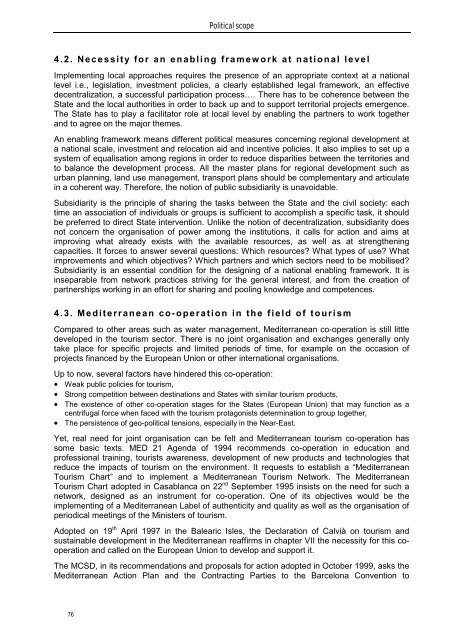dossier sur le tourisme et le développement durable
dossier sur le tourisme et le développement durable
dossier sur le tourisme et le développement durable
You also want an ePaper? Increase the reach of your titles
YUMPU automatically turns print PDFs into web optimized ePapers that Google loves.
76<br />
Political scope<br />
4.2. Necessity for an enabling framework at national <strong>le</strong>vel<br />
Imp<strong>le</strong>menting local approaches requires the presence of an appropriate context at a national<br />
<strong>le</strong>vel i.e., <strong>le</strong>gislation, investment policies, a c<strong>le</strong>arly established <strong>le</strong>gal framework, an effective<br />
decentralization, a successful participation process…. There has to be coherence b<strong>et</strong>ween the<br />
State and the local authorities in order to back up and to support territorial projects emergence.<br />
The State has to play a facilitator ro<strong>le</strong> at local <strong>le</strong>vel by enabling the partners to work tog<strong>et</strong>her<br />
and to agree on the major themes.<br />
An enabling framework means different political mea<strong>sur</strong>es concerning regional development at<br />
a national sca<strong>le</strong>, investment and relocation aid and incentive policies. It also implies to s<strong>et</strong> up a<br />
system of equalisation among regions in order to reduce disparities b<strong>et</strong>ween the territories and<br />
to balance the development process. All the master plans for regional development such as<br />
urban planning, land use management, transport plans should be comp<strong>le</strong>mentary and articulate<br />
in a coherent way. Therefore, the notion of public subsidiarity is unavoidab<strong>le</strong>.<br />
Subsidiarity is the princip<strong>le</strong> of sharing the tasks b<strong>et</strong>ween the State and the civil soci<strong>et</strong>y: each<br />
time an association of individuals or groups is sufficient to accomplish a specific task, it should<br />
be preferred to direct State intervention. Unlike the notion of decentralization, subsidiarity does<br />
not concern the organisation of power among the institutions, it calls for action and aims at<br />
improving what already exists with the availab<strong>le</strong> resources, as well as at strengthening<br />
capacities. It forces to answer several questions: Which resources? What types of use? What<br />
improvements and which objectives? Which partners and which sectors need to be mobilised?<br />
Subsidiarity is an essential condition for the designing of a national enabling framework. It is<br />
inseparab<strong>le</strong> from n<strong>et</strong>work practices striving for the general interest, and from the creation of<br />
partnerships working in an effort for sharing and pooling know<strong>le</strong>dge and comp<strong>et</strong>ences.<br />
4.3. Mediterranean co-operation in the field of tourism<br />
Compared to other areas such as water management, Mediterranean co-operation is still litt<strong>le</strong><br />
developed in the tourism sector. There is no joint organisation and exchanges generally only<br />
take place for specific projects and limited periods of time, for examp<strong>le</strong> on the occasion of<br />
projects financed by the European Union or other international organisations.<br />
Up to now, several factors have hindered this co-operation:<br />
• Weak public policies for tourism,<br />
• Strong comp<strong>et</strong>ition b<strong>et</strong>ween destinations and States with similar tourism products,<br />
• The existence of other co-operation stages for the States (European Union) that may function as a<br />
centrifugal force when faced with the tourism protagonists d<strong>et</strong>ermination to group tog<strong>et</strong>her,<br />
• The persistence of geo-political tensions, especially in the Near-East.<br />
Y<strong>et</strong>, real need for joint organisation can be felt and Mediterranean tourism co-operation has<br />
some basic texts. MED 21 Agenda of 1994 recommends co-operation in education and<br />
professional training, tourists awareness, development of new products and technologies that<br />
reduce the impacts of tourism on the environment. It requests to establish a “Mediterranean<br />
Tourism Chart” and to imp<strong>le</strong>ment a Mediterranean Tourism N<strong>et</strong>work. The Mediterranean<br />
Tourism Chart adopted in Casablanca on 22 nd September 1995 insists on the need for such a<br />
n<strong>et</strong>work, designed as an instrument for co-operation. One of its objectives would be the<br />
imp<strong>le</strong>menting of a Mediterranean Label of authenticity and quality as well as the organisation of<br />
periodical me<strong>et</strong>ings of the Ministers of tourism.<br />
Adopted on 19 th April 1997 in the Ba<strong>le</strong>aric Is<strong>le</strong>s, the Declaration of Calvià on tourism and<br />
sustainab<strong>le</strong> development in the Mediterranean reaffirms in chapter VII the necessity for this cooperation<br />
and cal<strong>le</strong>d on the European Union to develop and support it.<br />
The MCSD, in its recommendations and proposals for action adopted in October 1999, asks the<br />
Mediterranean Action Plan and the Contracting Parties to the Barcelona Convention to
















